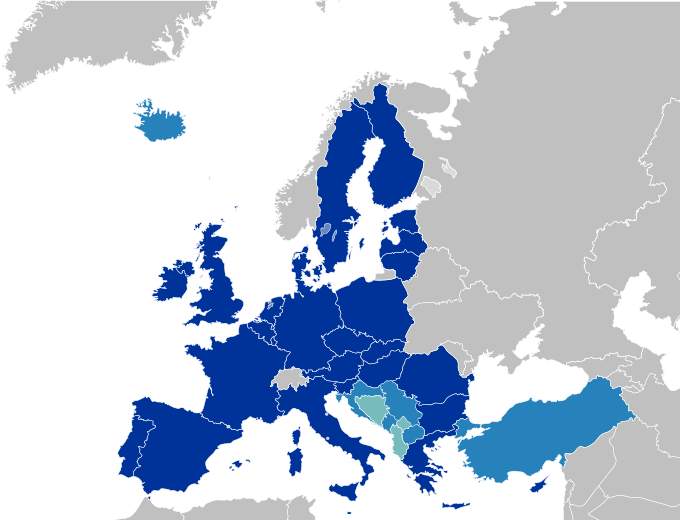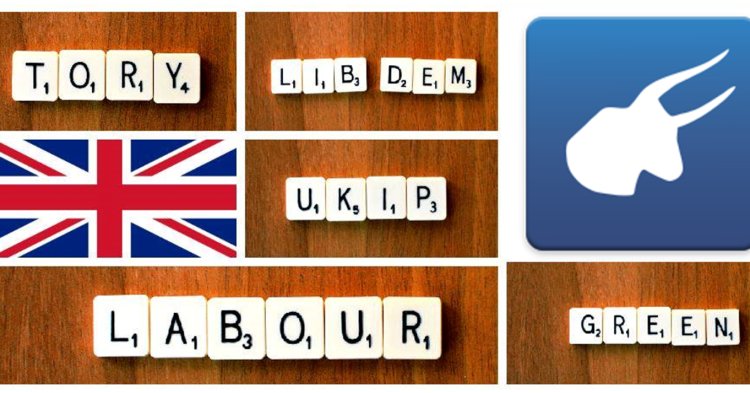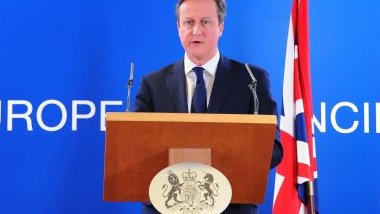After 5 years of a Conservative-Liberal Democrat coalition government, the reputation of the Cameron cabinet has eroded among the public over a number of questions relating to foreign policy on the one hand (EU, immigration) and on the other issues linked to the economic crisis (privatisation of the National Health Service, tuition fees, austerity...). David Cameron’s plan is to continue governing in coalition with his liberal partners, but the collapse of the latter, the weakening of the Conservatives, and the rise of the SNP serve to make difficult the task of forming a government both for Cameron as well as for Ed Miliband and the Labour Party.
Still, this scenario allows Cameron and his party to play on the fear of a Labour-SNP partnership; invoke the so-called “useful vote” to take votes away from UKIP; and to uphold the promise of a referendum on remaining withing a ’renegotiated’ EU which is expected to take place around 2017, but not to advocate leaving the European Union.
Positions on Europe:
On the question of staying in the European Union, the Labour Party is in favour of powers to prevent further transfers of powers to the Union, which if carried out would have to be ratified by a referendum, as well as reforming the EU in several areas such as the Common Agricultural Policy, immigration (an issue of great importance for British citizens), and benefits.

Labour’s position is quite moderate when compared with Nigel Farage’s UK Independence Party, which calls for an immediate exit from the EU which maintaining trade relations with it. Parties like the Liberal Democrats strongly oppose leaving the EU, and the Green Party is committed to remain in the EU though is in favour of a referendum.
Meanwhile, the nationalist parties in Scotland (Scottish National Party) and Wales (Plaid Cymru) agree in that, in the event of a referendum, each and every one of the UK’s ’countries’ should have to vote in favour of leaving the Union in order for a Brexit to occur. In the case of Northern Ireland, Sinn Féin seeks to carry out its own referendum, which then brings into play the question of a likely change in the relationship with the Republic of Ireland if an exit from the EU is to take place.
In discussing the ’European question’ which has long been pertinent among the British, we cannot ignore the UKIP. Although it came out of the previous European elections victorious, it is still seen as a single-issue party and in General Elections a whole series of citizens’ issues and concerns come into play which all matter when it comes to voting. Although the polls put them in third place with around 15% of the vote, the projections predict they will only have four seats. One of the seats UKIP hopes to gain is the constituency of South Thanet on the Kentish coast where Nigel Farage is the party’s candidate. The polls put him on the verge of winning the seat in a tight battle with the Tory candidate.
Some in Brussels, including Jean-Claude Juncker himself, have publicly expressed their hope that Farage is elected a Member of the Westminster parliament, because he would have to leave his seat in the European Parliament. This would render the EFDD (Europe of Freedom & Direct Democracy Group) decapitated with the loss of its charismatic and energetic leader, who would be replaced as MEP by the second candidate on UKIP’s list for South-East England, Donna Edmunds, who caused a stir last year for defending homophobic statements that traders could refuse to serve gay people.
TTIP, Russia, & the environment:
In the field of international and commercial relations enter two highly topical issues but they are perhaps not as central to the political debate in Britain: TTIP and relations with Russia in light of the Ukraine crisis.
Regarding TTIP [1] the only parties that are completely opposed to the agreement are Plaid Cymru and the Green Party, whilst the position of the UKIP and SNP is to oppose it but only to propose exemptions for the NHS and some other public services from the treaty. On the other side of the board are the three ’traditional’ parties (Conservative, Labour and Lib Dem) which fully support TTIP, although the latter two intend to ensure the NHS is unaffected by it.
The diplomatic crisis with Russia has been felt even less in this campaign, being an issue that has not caught the attention of the British electorate. Even so, the parties have in one way or another, taken a stance on it. David Cameron has in recent months defended the idea that the West should increase sanctions against Russia still further, a position similar to that of Labour which is still cautions about the possibility of using military force. For its part, UKIP has vocally criticised the European provocation of Russia, blaming the Union for the crisis. The SNP has participated in a low-level debate on relations with Russia, proposing its councillors on Glasgow city council to end its relations with the Russian city of Rostov-on-Don (with which it is twinned), both because of the Ukraine conflict as well as the violations of LGBT+ rights in the Russian Federation.
Finally, the environment and the fight against climate change have been completely put aside in this electoral campaign, with there being virtually no reference to these issues in the debates or in the party political broadcasts. In this area, the Green Party has decided to concentrate on economic issues and the fight against austerity, ignoring the issue of the environment. Despite this neglect, there have been many types of proposals and no party has reached agreement on proposals, although the majority seek to reduce emissions. From the protectionism of the Green Party with proposals to ban fracking and the gradual elimination of energy generated by fossil fuels and nuclear power, to the promotion of electric transport suggested by the Lib Dems, or the aim to reach zero emissions in energy production by 2013 as proposed by the Labour Party.
Moreover, this election promises a radical change for the British political landscape with some important changes at the level of political representation with the coming into force of several ’new’ parties.
Rise of the ’new’ parties:
On the one hand, we have the explosion in support for a reenergised SNP, which has seen an incredibly surge in popularity since the celebrations around the referendum of independence in September last year. Since then the party has not stopped growing, and has done so at an unstoppable pace, quadrupling its membership in around 6 months thus making it the third largest party in terms of membership (after Tories and Labour).

At the same time it has been able to turn a page with the stepping down of Alex Salmond and maintain and consolidate its position under the leadership of Nicola Sturgeon, who knew how to enchant British viewers in a debate of the seven party leaders on ITV (some polls placed her as one of the top three candidates, or even as the winner [2]). They have managed this by combining their traditional role as defenders of the autonomy and the interests of Scotland with that of being guarantors of the Welfare State, making the defence of the NHS and the abolition of the bedroom tax their flagship policies. It will continue working to improve the UK Sturgeon summed up perfectly in mid-April: " as long as Scotland remains part of the Westminster system it really matters to the people of Scotland that the decisions made at Westminster are good decisions.” [3].
The SNP boom jeopardises the ability of the Labour Party to defeat the Conservative government without needing to form a coalition, as it looks set to lose its traditional stronghold in the form of Scotland (where it has gained almost continuously since 1945). Labour has played the fear card (just as the Tories have done) by associating a vote for the SNP with five more years of Cameron’s government, but the tactic does not seem to be working, judging by the polls.
At the same time, attention has been drawn to the growth of the Green Party of England and Wales, led by Natalie Bennett, which has grown significantly in a short space of time in terms of both its membership and its potential support at the polls, with the latest polls giving a range of 4-8% of the vote (its best result was in 2005 with 1% of the vote). Despite this, the electoral system will in all probability turn this increase in support into an increase in seats.
The British electoral system is characterised by the way in which it elects its members to the legislative bodies through what is called First Past The Post, that’s to say, in unitary constituencies (of a single member) in which the candidate obtaining a simple majority of votes wins the seat in question. This system makes it very difficult to predict the outcome of the election in terms of elected candidates, at the same time being very difficult for the smaller parties like UKIP or the Green Party to gain any representatives in Westminster or to make the number of votes they have proportionate to their level of popular support.
And finally we have the collapse of Nick Clegg’s Liberal Democrats, which has gone from treading on Labour’s heels in 2010 (predicted to overtake them and providing for a return of the Liberals to beig the second voting force for the first time since 1910) to its collapse in support among the public. In this directon, the polls have since 2010 been predicting, one after another, the quick fall to its worst result in history, because to find similar results for British liberalism you must go back to the 1960s when there was still the old Liberal Party.
This General Election is going to be fought on many fronts (relations with the European Union, austerity, immigration) and will certainly usher in a change in the policies carried out from Downing Street. But the biggest unknown is to see which of the two major parties will be in the better position to reach agreements with the smaller parties, the key-holders to number 10, and to put their candidate in the Prime Minister’s Office.



Follow the comments: |
|
